Operation Compass. Catastrophe of the Italian army in North Africa
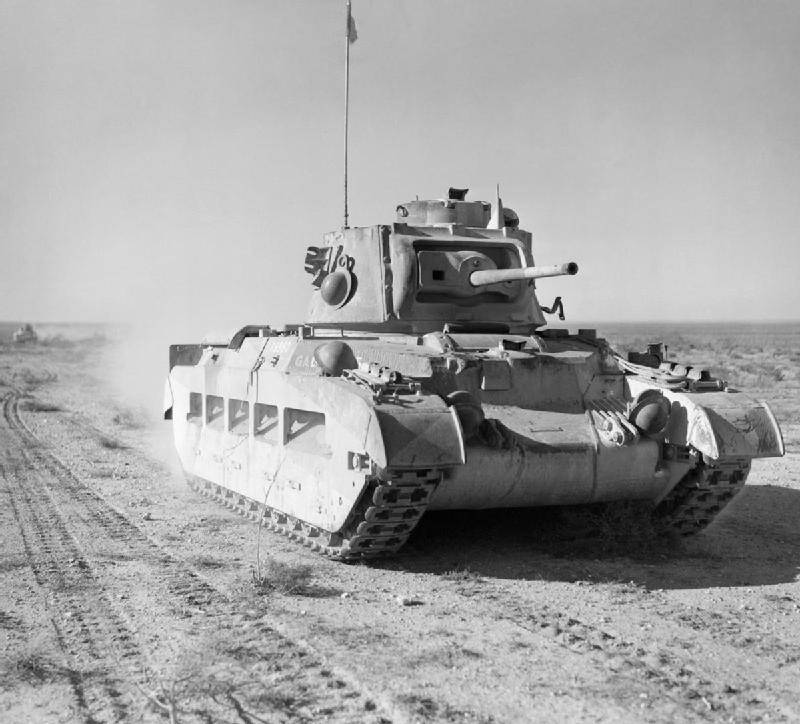
Tank "Matilda" of the 7th tank regiment on the march. December 19, 1940
80 years ago, the first British offensive in Africa began - the Libyan operation. The British cleared the previously lost territory of Egypt from the enemy. They occupied Cyrenaica (Libya), and in January 1941 - Tobruk. In February we went to the El-Ageila area. Most of the Italian army surrendered. The remaining troops lost their combat effectiveness.
Italian offensive
In September 1940, the Italian army, located in Libya, began the Egyptian operation ("How Mussolini Created the" Great Roman Empire "; H. 2). The Italian high command planned, using the difficulties of Britain after the start of the war with Germany and the weakness of the British forces in the region, to capture Egypt.
The Italians needed to occupy Suez to reestablish contact with their colonies in East Africa. However, despite the greater superiority in forces (over 200 thousand people against 35 thousand), the Italian army was unable to achieve serious success. The Italians have advanced 80-90 km. The British retreated, avoiding defeat.
A "no-man's" buffer zone of 130 km was formed.
The stoppage of the offensive of the Italian army was associated with several reasons: low combat and technical readiness of the Italian troops, poor organization of supplies (in particular, lack of drinking water), unsatisfactory communications.
The Italians were unable to achieve dominance in the Mediterranean. This put the communications of their North African group at risk. Also, Italy was preparing to seize Greece, which became a priority task.
Therefore, the Italian commander, Marshal Graziani, suspended hostilities in anticipation of developments in the Balkans ("How the mediocre Italian blitzkrieg failed in Greece"). He believed that the British would be distracted by events in Greece, which would allow his troops to resume the offensive against Suez.
The front has stabilized. There was a lull for about three months.
The main reason for stopping the Italian army was due to its weakness. Graziani knew well the state of the army and did not believe that the Italians could defeat the British on their own. At first, Rome was waiting for the landing of the German army in the British Isles, which should have demoralized and left the British troops in Africa without support.
In October 1940, it became clear to Mussolini that the Third Reich had abandoned the landing operation against England and was preparing an attack on Russia. Rome decided that it was time to expand its possessions on the Balkan Peninsula, to capture Greece. However, the Greeks gave the Italians a decisive rebuff and almost drove them out of the Balkans. Mussolini was forced to ask Hitler for help.
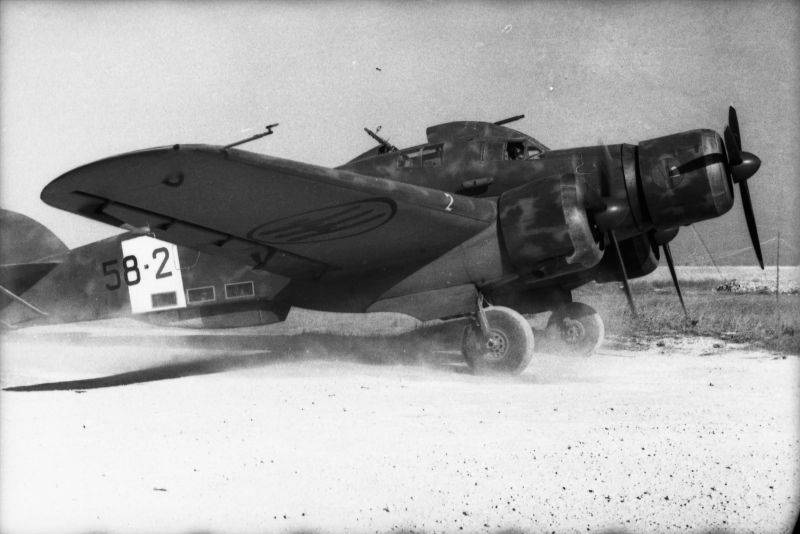
Italian bomber SM.79 taxiing at an airfield in North Africa.
Germany plans
Berlin decided to use the situation to invade the Mediterranean basin, which Rome considered to be its sphere of influence. On November 20, 1940, Hitler invited Mussolini to send a large aviation group. But with the condition of creating two operational regions: the Italian zone - Italy, Albania and North Africa, the German - the eastern part of the Mediterranean Sea.
That is, the Fuhrer delineated the spheres of influence of Germany and Italy in the Mediterranean. Mussolini had to agree. Italy began to lose its strategic and operational independence from the Reich. And there was a time when Mussolini believed that
Hitler had his own plans for the eastern Mediterranean. The path to Persia and India went through the Balkans, Turkey and the Middle East. Ribbentrop's solemn promises, which he made in 1939 (that the Mediterranean was not interested in the Third Reich), were immediately forgotten.
Of the ground forces, the German command planned to transfer only one to North Africa in the fall of 1940. tank division. Hitler did not dare to deploy a large contingent in Africa, concentrating all his forces for a "lightning war" with the Russians.
Although if he refused to war with Russia, the Reich could easily transfer an entire army to Libya, occupy Suez, Palestine, and then go to Persia and India. That is, to check and checkmate India. However, the Fuhrer was not going to really fight with England ("Why did Hitler not finish off Britain?"). He aimed at Russia.
In October 1940, a German military mission led by General Thoma arrived in Rome to negotiate the dispatch of German troops to Libya. Now the Italian command hoped that their army in Libya would be reinforced with German tanks, which would allow them to reach Suez. Without German reinforcements, Graziani did not try to advance further east, especially after the failure of the Italian aggression in Greece.
With great difficulty, the Italians bargained for 200 tanks and armored vehicles from the Germans. Hitler was preparing for aggression against the USSR and did not want to dissipate his forces. The Mediterranean was still a secondary theater for the Fuhrer.
At the same time, Hitler demanded the return of the tanks and soldiers by May 1941. That is, the division was transferred to Italy for a very limited period. And in December 1940, Hitler already demanded that the division be returned before February 1941.
The situation at the front. British plans
British troops were in the area of the city of Mersa Matruh, leaving only patrols 30-40 km west of it. The opponents did not have direct contact.
The Italians first expected victory in Greece. Then - reinforcements from the Germans. At this time, on the occupied territory, the Italians erected 5 fortified camps, which formed a large arc from the coast inland up to 70 km. The camp fortifications were primitive, just walls. They had no fire and tactical communication with each other, the space between them was not guarded.
Around Sidi Barrani, the Italians erected two lines of field fortifications. The main forces of the Italian army were based on the coast, where ports, airfields and relatively good roads were located. There were separate fortified points in the desert to protect the flanks from unexpected envelopment and detour from the south.
By December 1940, a favorable military-political situation had developed for Britain. It was obvious that Hitler refused to strike at England and concentrated all his attention and strength on the Russians. The Italian blitzkrieg in Greece failed, revealing the weakness of the Italian war machine.
London was given the opportunity to strike back at Italy. The British commander in Egypt, Archibald Wavell, decided to carry out a limited operation to drive the enemy out of Egyptian territory and restore the situation that was before the Italian offensive on September 13, 1940. If successful at the first stage of the operation, the British were going to develop an offensive to El Sallum and beyond. But they didn’t believe that at Wavel's headquarters. The Italians still had great superiority in manpower and equipment. That is, it was a private operation, not a strategic one.
The British armored forces were to pass through the unprotected space between the two enemy camps, Nibeyva and Bir Safafi, turn sharply north and strike from the rear at the Italian camps. Then reach the coast in the Bugbug area (between Es-Sallum and Sidi Barrani), trying to cut off the enemy's escape routes in Sidi Barrani.
The armored division was followed by the infantry. Small forces pinned down the enemy on the flanks. The Air Force was tasked with bombing Italian airfields within two days. Navy - shelling Maktila forward camp on the coast.
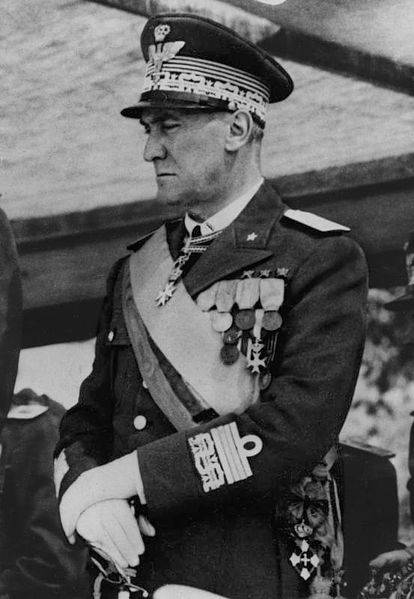
Rodolfo Graziani, Governor General of Libya, Commander-in-Chief of Italian Forces in North Africa.
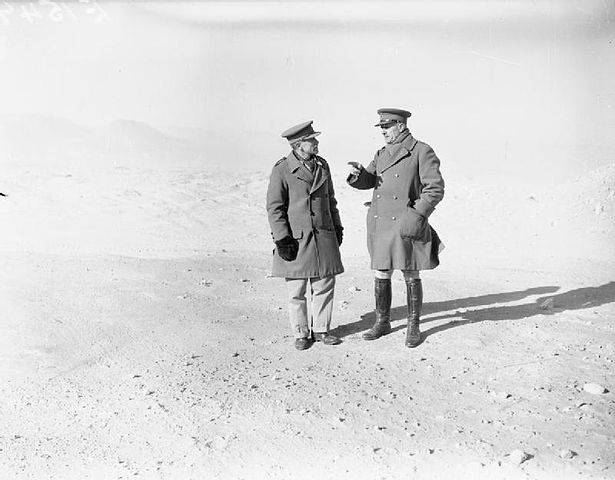
Archibald Wavell, British commander-in-chief for the Middle East, and Richard O'Connor, commander of the Nile Army, during the assault on Bardia.
The forces of the parties
The balance of power remained virtually unchanged by December 1940. The Italian army retained the advantage: 5 corps of the 10th army (10 divisions and a mechanized group), a total of 150 thousand people, 1600 guns, 600 tanks and 331 aircraft (5th squadron of General Porro).
In the first echelon there were 6 divisions (up to 100 thousand soldiers and officers) and many engineering and technical units that were engaged in the construction of roads and a water supply system. At the key points - Tobruk, Derna, Benghazi and others, there were strong garrisons with a force no less than a division.
The Italians were armed with light tanks L3 / 35 and medium tanks - M11 / 39. They were inferior to British tanks in power and armor. So, the medium tanks M11 / 39, due to an unsuccessful device, had a limited range of the gun, weak armor and an insufficiently powerful obsolete 37-mm gun. A special headache for the Italian tank crews was brought about by the lack of radio communications, the tanks were not equipped with radio stations.
The British Army Neil, under General Richard O'Connor, included the 7th Armored Division, two infantry divisions and a tank regiment. A total of about 35 thousand soldiers, 120 guns, 275 tanks and 142 aircraft (202nd Royal Air Force Group). But only the 7th Armored Division, the 4th Indian Infantry Division, the Panzer Regiment and the Mersa Matruha garrison took part in the offensive.
In the first echelon there were only about 15 thousand people.
The British tank units consisted of cruising, light tanks (Mk I, Mk II and Mk III). The 7th separate tank regiment was armed with 50 medium tanks Mk.II "Matilda", against which both Italian tanks and their anti-tank guns were powerless.
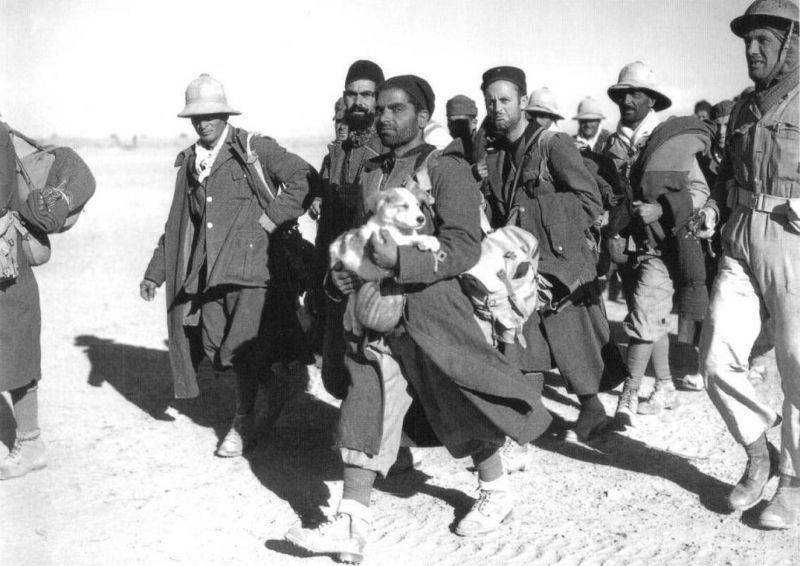
Italian prisoners of war under escort. North Africa. December 1940
Operation Compass
It seemed that with such a balance of forces, the Italians should have simply crushed the British. However, the Italians showed their usual carelessness.
Not only did they not prepare the defense in the available time, they also did not organize observation and reconnaissance of the enemy. As a result, the enemy attack became sudden for the Italian army.
On December 9, 1940, the British launched Operation Compass. A small force attacked from the front and distracted the attention of Nibeywa's garrison. Meanwhile, British tanks passed between the two enemy camps and attacked Nibave's camp from the rear. This took the enemy by surprise. The Italians were unable to oppose anything to the enemy. The camp fell.
Then the 7th Panzer Division was divided into three groups. The first moved through the desert to the Bir Safafi camp, the second to the coast, the third to Sidi Barrani.
The Italian army was completely demoralized by the enemy blow from the rear. The Sidi Barrani garrison surrendered on December 10 without a fight. General Gallini's 80-strong group with 125 tanks surrendered.
30 thousand Englishmen were celebrating a victory that they did not expect.
The camp at Maktila (on the coast) was abandoned after shelling by British ships. The remaining 500 Italian soldiers left behind weapon after two machine-gun bursts. The 64th Catanzaro Infantry Division, which had been intercepted while fleeing, surrendered without a fight. The garrison of the Bir-Safafi camp, without waiting for the approach of an insignificant British detachment, went to Bardia without a fight.
On December 16, the Italian troops left Es-Sallum, Halfaya, Capuzzo, Sidi Omar without a fight. They abandoned the entire system of forts and fortifications they had built on the border of the Libyan plateau.
Thus, from one successful attack by the British, the entire defense system and the Italian army itself fell apart. The British thwarted the enemy's preparations for a future offensive in the Nile Delta and created the possibility of developing an offensive in Cyrenaica.
Graziani lost contact with the remaining troops. And on December 13, he sent a panicky telegram to Rome, in which he offered to take the remaining parts to Tripoli.
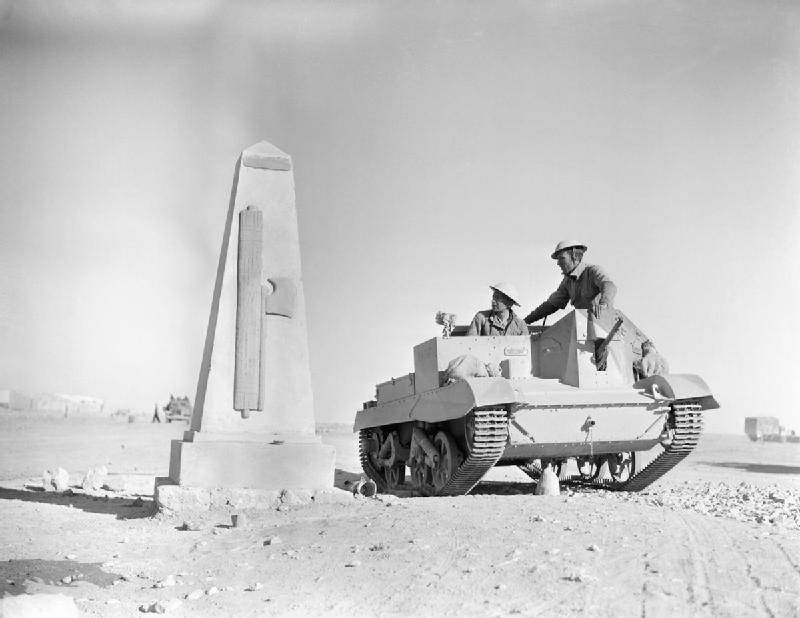
The crew of the British armored personnel carrier Universal Carrier examines the memorial sign erected by the Italians in honor of the capture of Sidi Barrani a few months earlier. December 16, 1940
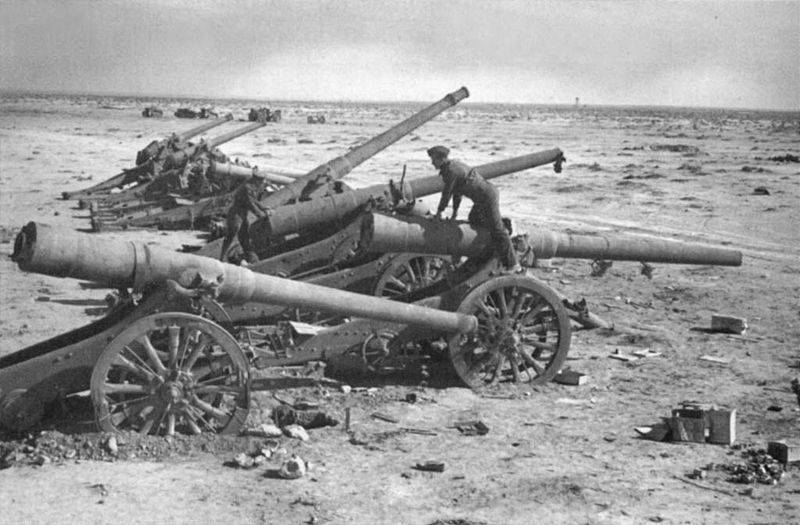
Battery of Italian Cannone da 149/35 and 120/25 guns captured by the British.
"Battles" for Bardiya and Tobruk
On December 16, 1940, British troops reached Bardia, where the remnants of the Italian 10th Army took refuge. But they did not dare to attack on the move. The enemy still had an advantage in strength. There were no reserves for the development of the first success.
The British command failed to assess the significance of the first stage of the operation in time. In fact, the 10th Italian army was defeated, tens of thousands of soldiers surrendered. The remaining parts were completely demoralized. The Italian commander went into hiding to save himself. The troops were left without control. It remains to finish off the enemy and establish full control over Libya.
In fact, the British simply did not realize the seriousness of their victory. The enemy just fell from one poke. Wewell was redeploying forces: the 4th Indian Division was transferred to Sudan. She was replaced by the 6th Australian Infantry Division. The 4th Division was withdrawn immediately after the capture of Sidi Barrani, although it could have been left and the Australian Division used as reinforcements.
On January 1, 1941, the Nile Army was reorganized into the 13th Corps. As a result, an amazing situation developed: while the defeated Italians fled in panic to the west, a significant part of the British strike force turned east. Only three weeks later, when the new division arrived, the British were able to resume their attack.
The British had poorly organized their military intelligence and only on January 1 discovered that the Italians were leaving Bardia. On January 3, the assault began, there was practically no resistance. The Italians, who did not have time to escape and did not want to fight anymore, hid in the caves. When the British entered the fort they threw out the white flag.
On January 5, British troops occupied Bardia. Thousands of Italians laid down their arms. The British moved along the seaside road to Tobruk, where there were over 20 thousand Italian soldiers. The line of the outer fortifications of Tobruk stretched for 48 km, the inner ones for 30 km. Tobruk Bay was the best port between Alexandria and Benghazi. Italian ships were stationed here.
On January 7, 1941, British tanks were at Tobruk. January 9 - the city was blocked. But the British were able to start the assault only on January 20, when they pulled up the infantry and rear.
And here the Italians could not offer any resistance. And on January 22nd they threw out the white flag. The Italian commanders were so helpful that they themselves showed all the traps, warehouses and handed over over 200 guns and 20 tanks intact.
It is clear that with such "resistance" of the Italian army, the losses of the British were insignificant - over 500 killed and wounded (over 1900 people for the entire operation).
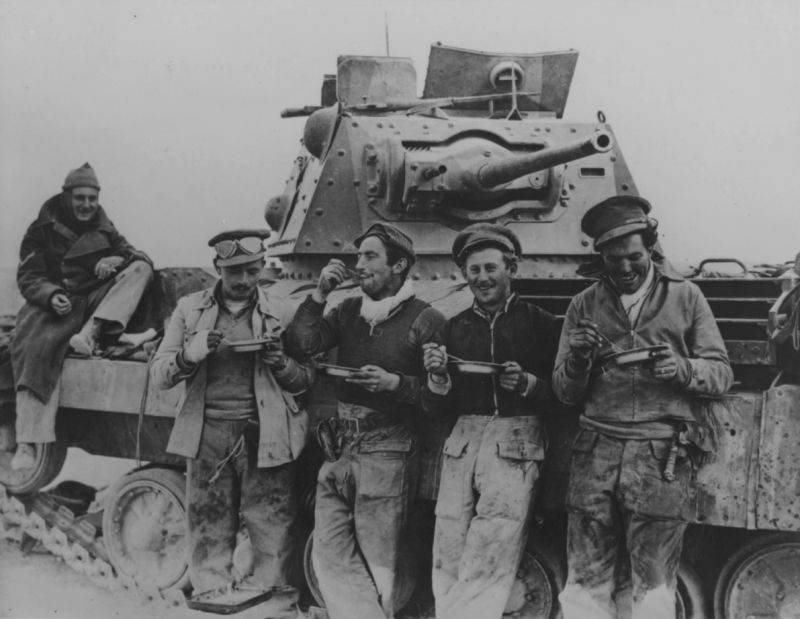
The crew of the British cruiser tank A10 (Cruiser tank Mark II) at lunch in the area of Fort Bardia.
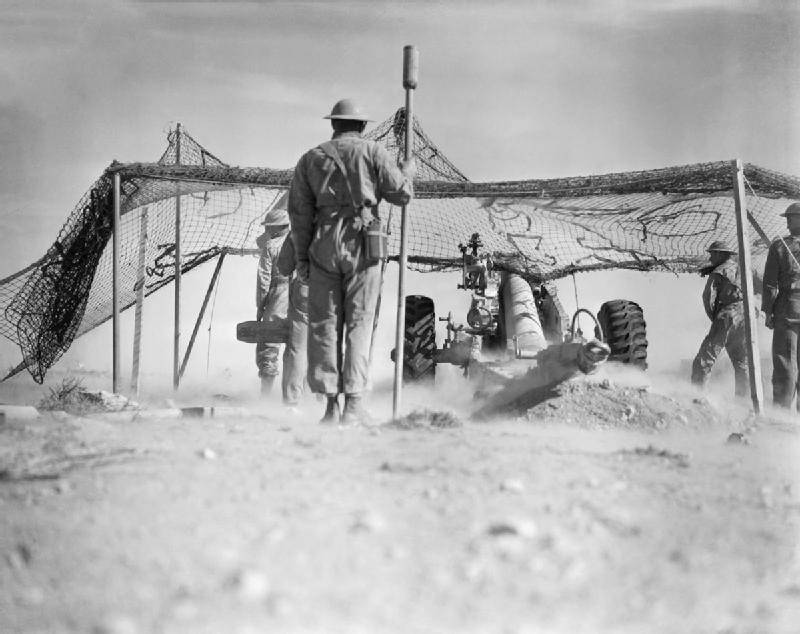
British artillery fire at Bardia. December 31, 1940
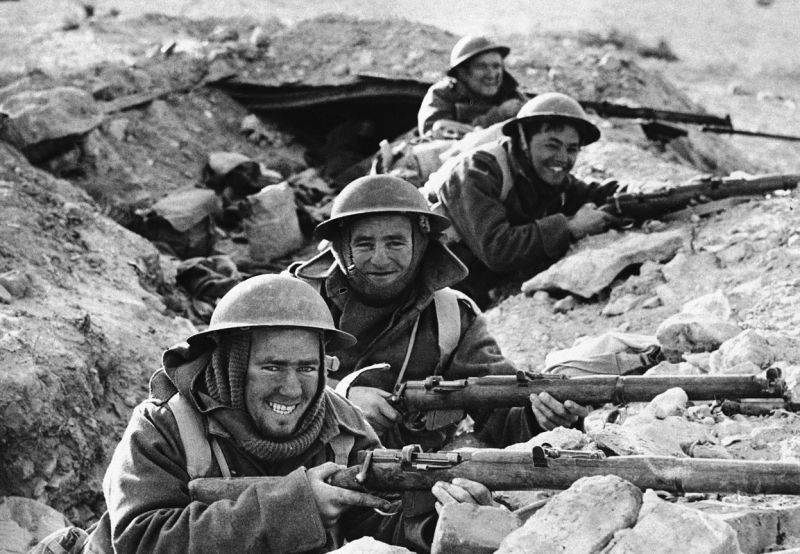
British soldiers in trenches in Libya near the port of Bardia. Armed with 1904 Lee-Enfield rifles, dressed in winter uniforms. January 5, 1941
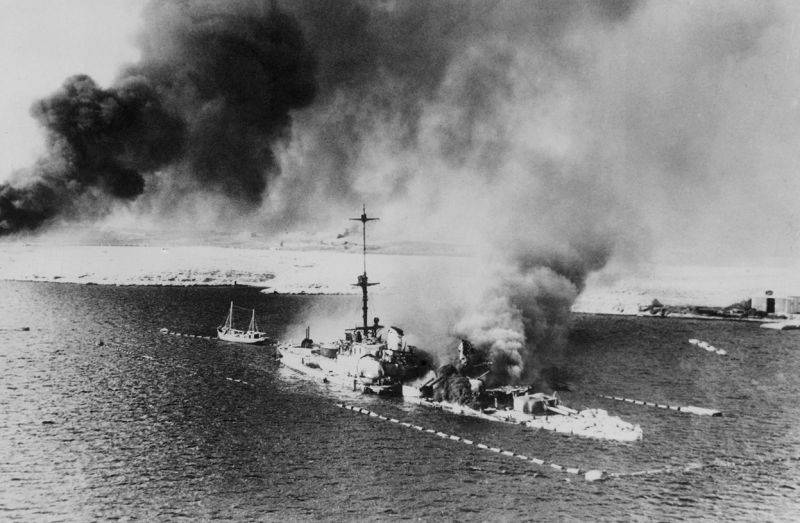
Burning Italian cruiser "San Giorgio" in the harbor of Tobruk. The picture was taken from an English plane. The cruiser was used in the defense of Tobruk as a floating battery. On January 21, 1941, the ship at anchor in the port was attacked by British bombers. Having received several hits from aerial bombs, the cruiser sank to the bottom. The San Giorgio was sunk in Tobruk on January 22, 1941, before the city was abandoned.
A missed opportunity to finish off the enemy
The remnants of the Italian troops fled to Benghazi.
After the surrender of Tobruk, the British consolidated their position in the Mediterranean. Tobruk linked Malta and Alexandria, Malta and Crete, British forces in Egypt with Gibraltar. The British moved relatively slowly and methodically from Tobruk to Benghazi. The Italians did not offer any resistance, they did not even come into contact with the enemy.
The British fleet could hasten the collapse of Italy in North Africa with its strikes and landings, but did nothing. The British Admiralty stuck to the line that the fleet was itself. The ground forces are solving their tasks.
At the headquarters of the British army, the civil administration had already arrived from Benghazi for negotiations on surrender. On February 10, 1941, the calm movement of British troops stopped at El Ageila on the orders of Churchill.
Rather than occupying Libya entirely (and without much difficulty), London decided to focus on Greece. This allowed Italy to avoid a complete collapse in Libya and keep Tripolitania. Wavell was ordered to leave a minimum of forces in Libya and prepare the main troops to be sent to the Balkans.
During the Libyan operation, the Italian army lost about 130 thousand people (of which 115 thousand were captured), 400 tanks (120 were captured by the British), about 1300 guns, about 250 aircraft. It was a complete rout.
The Italians were driven out of Egypt and lost a significant part of Cyrenaica.
The disaster of the Italian army was caused by the poor quality of its troops. The command showed complete carelessness and relaxation. The defense was not prepared, although there was time. The reconnaissance was not organized.
The enemy strike came as a complete surprise. Unsatisfactory level of training of commanders. Low troop motivation. They fled at the first threat. No "Brests" and "Stalingrad".
Hordes of Italians surrendered to small units of the enemy. Although many units had experience in fighting in Ethiopia and Spain. The soldiers were already tired of the war and felt their helplessness compared to the British or the Germans. Poor material and technical condition of the troops. The colonial troops did not have modern weapons, and the Italian divisions themselves were inferior to the enemy in weapons.
The troops lacked modern tanks (and the new tanks had a lot of shortcomings), anti-tank, anti-aircraft and field artillery, vehicles (low mechanization of troops). The Air Force was mainly armed with aircraft of obsolete types. Disadvantages of communications and command and control. Orders, as in the old days, were passed by liaison officers. Poor supply.
Italy's total failure in North Africa raised concerns among Hitler. He feared that England would get the opportunity
which will cause psychological shock in the country. Rome capitulates. Germany will lose an ally in the Mediterranean. British forces in the Mediterranean will have freedom of action, they will threaten Southern France. Britain will free ten divisions for the war against the Reich.
Therefore, Berlin decided to urgently help the ally. The German Air Force was supposed to take under guard the convoys of Italians, to strike at the sea routes of the British.
The ground forces were given the task of sending a tank division to Africa.
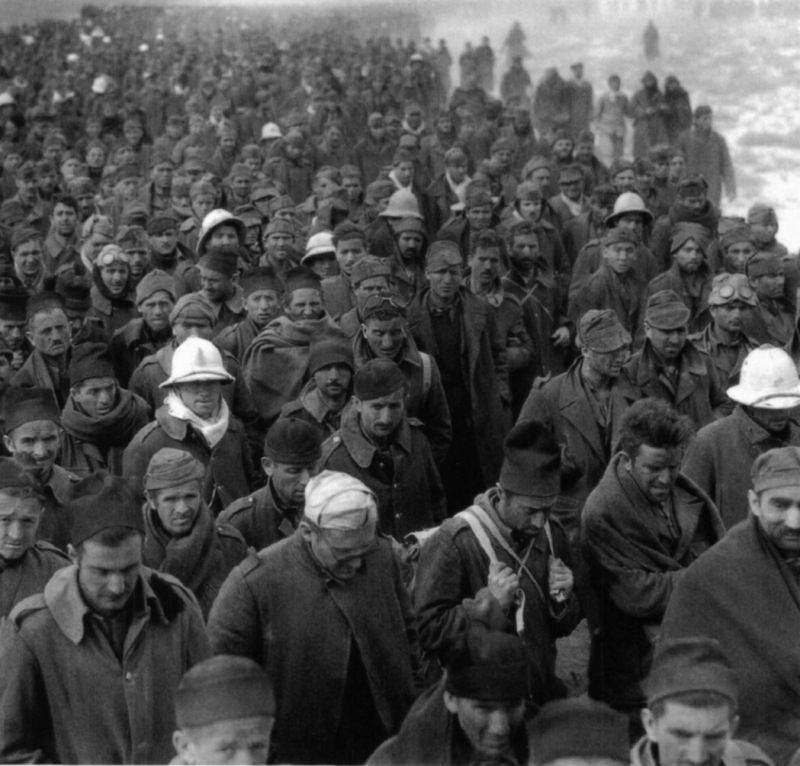
A column of Italian prisoners of war from Fort Bardia goes to the gathering place. January 6, 1941
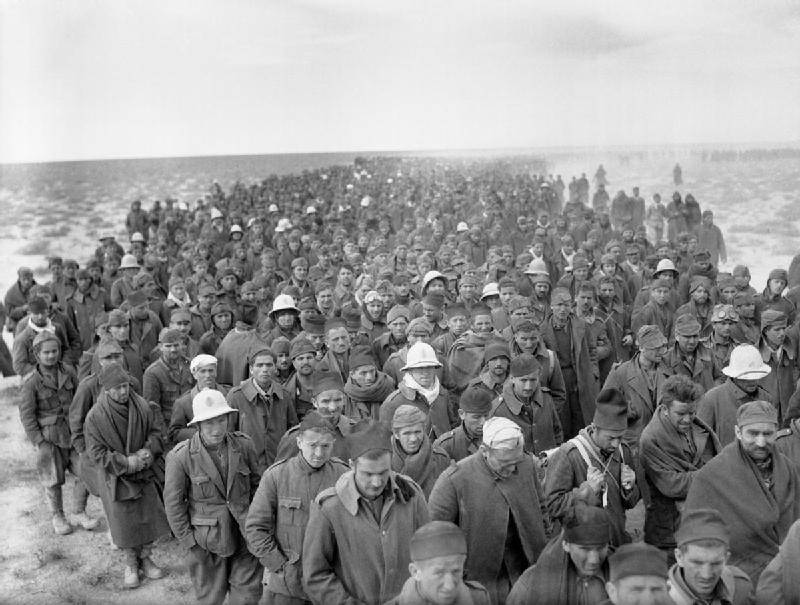
Italian prisoners of war captured during the Libyan operation.
- Alexander Samsonov
- https://ru.wikipedia.org/, http://waralbum.ru/
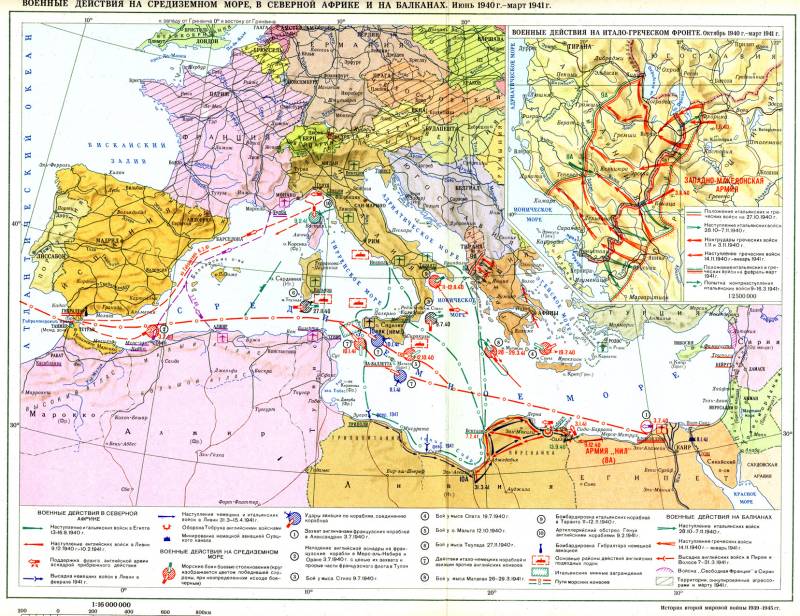
Information